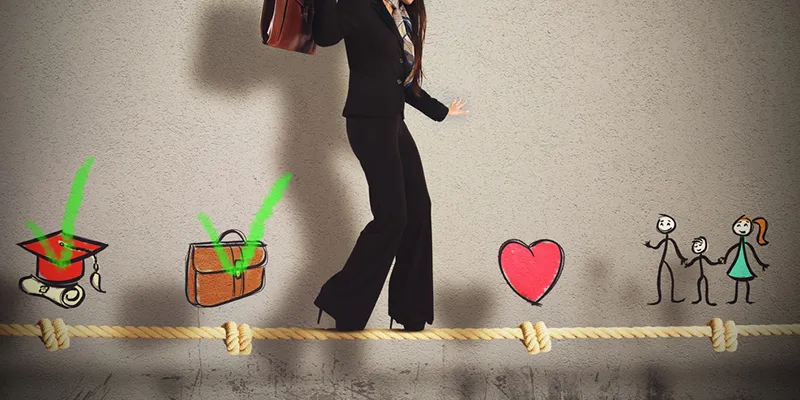No, thinking about work 24x7 does not make you a stellar performer
“Leave work at work” is a cliché that many well-wishers repeated to me in my peak workaholic days. Though, I will admit that being plugged in 24x7 did not make me a stellar performer. All it made me was a bit of a control freak with zero delegation capabilities. I was also exhausted, on the edge, and felt incredibly self-important now that I think about it. Accountability simply means making sure you deliver your end of the deal. It should not mean doing everything yourself, taking no breaks, and expecting rewards for something that is neither expected of you nor makes you special in any way. I just did not know it then.

Image: Shutterstock
It took me a work-related disappointment, about six years after I started working, to see that work did not have to be the only reason for my existence. That is when I saw that the burden of an entire organization, practice, business unit, or skill did not need to fall singularly on my shoulders. I realised teamwork is essential not only for collaboration and great delivery but also so that everyone gets their rightful downtime, including me.
It is not news that the inability to switch off can adversely affect one’s productivity. Today, many organizations show-off work-life balance as part of their employer branding and culture. This is enough to display that their expectations are in the right place, at least on paper. The onus to make them accountable for it is in our hands. Each one of us knows that getting away and switching off has its benefits. We understand that recharging our batteries is crucial not only to our own physical and emotional well-being, but also the quality of work we deliver. It is not hard to understand that downtime from complex issues allows us a fresh perspective. What is difficult is raising our standard of discipline, people and time management, and delegation to be able to afford the luxury of downtime. The behavioural changes required to just “let go” does not come naturally to most of us.
As someone who has made the switch from being a 24x7 workaholic to having a much more balanced approach, I will tell you this – the transition is difficult and needs more than strong resolve. It needs significant behavioural changes. I am going to try and break down these behavioural changes to make ‘leaving work at work’ sound just a little more feasible.
Chart out your personal time
The first few weeks when I decided to leave office at 6:30 pm and switch off from work, all I did was think about work on my couch instead of my office desk. That was because I had set a negative goal for myself. My resolution was great in theory but constantly reminding myself not to think about work was exhausting, not to mention utterly useless. Since I suddenly had a 6:30-9:00 pm slot free, I knew I needed to fill it with positive goals, things I could tell myself I needed to do instead of telling myself what I could not do.
I started with running a schedule, switched to gym. Some days, I just cooked up a storm. I had a list of TV shows I needed to watch, books I should have read years ago and more. Staying busy in other pursuits ensured that over time, my brain was trained to rarely feel the need to get right back to work mails as soon as I got home.
Strict no to keeping tabs on work emails or messages post office hours
Of course it didn’t mean that if a notification popped up, I didn’t fall right back into the abyss. But I couldn’t switch off my notifications, could I? The world could have ended while I was busy with the latest sitcom or biryani recipe! But I decided to try it for a week and nobody died! Most of my self-importance at work was of my own making. Even my clients understood boundaries if I demanded it – nicely, of course. And suddenly, it dawned on me that people deserve more credit than I gave them; that they actually did understand what the word “urgent” meant! Trust me, if it is an “urgent” matter they will call you. So constantly checking your messaging apps and work emails is also quite pointless.
Final office hours spent going through check list
A lot of my post-work stress also came from the fact that I did not centre myself and look through my checklists before I left work. Just a 10-minute buffer to figure out all that was done and everything that was scheduled for the next day gave me the breathing space I needed. I called this my ‘worrying slot’. Since I like schedule and structure for most things, I gave myself a buffer to worry too. Now, I swear by comprehensive to-do lists as a time management tool.
Trusting and relaying accountability to team
I taught myself to trust other adults to deliver what they commit and to demand accountability from everyone and not just myself. It was then time to take the switching off to the next level – going away on vacations without feeling the need to “check in” constantly. I knew I had a brilliant, fairly independent team that knew its job and did it well. There was no reason they wouldn’t come through if I trusted them. It was a “risk” worth taking! But I also knew that the issue was with me, not with my team. I needed to be reassured before I left on vacation. The process started with a legendary handover email that most people humorously (and accurately) labelled “Type A”. But a girl’s got to do what she’s got to do! So I made a laundry list of all that needed to be done in the week that I was away, who was accountable for each of it, along with document links and deadlines. These handover emails became a norm within the team, if only to ensure that we returned the favour of not being disturbed during vacation.
I have said this several times before and I will say it again. If you are accountable, honest, and disciplined in the hours that you do spend at work, chances are you will have a lot less to worry about when you get out.
Over the last few years since I started this journey of leaving work at work, I have come to realize that unless you are Jack Bauer saving the world from terrorists, nothing you do or don’t do is the end of the world. Most of our 24x7 involvement comes from self-importance that is of our own making. The process of a balanced life starts with realizing this simple fact, that a little discipline and consciously building a life outside of work does go a long way towards building a wholesome living. It is easier said than done, but it is worth the effort!
Read Also: Why finding the right work-life balance is necessary







